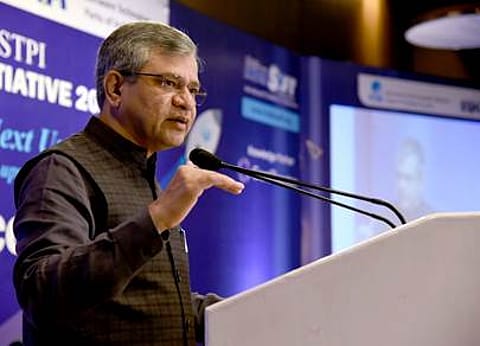Cabinet nod to railway projects worth ₹32,500 cr; ₹14,903 cr approved for Digital India expansion
PM-led Cabinet also approves a new central sector scheme, ‘PM Vishwakarma’, to support traditional artisans and craftspeople with an outlay of ₹13,000 crore

The Cabinet Committee on Economic Affairs, chaired by Prime Minister Narendra Modi, has approved 7 centrally funded projects of the ministry of railways, with an estimated cost of around ₹32,500 crore.
These multi-tracking proposals will ease operations and reduce congestion on the busiest sections across Railways. The projects will cover 35 districts in 9 states, including Uttar Pradesh, Bihar, Telangana, Andhra Pradesh, Maharashtra, Gujarat, Odisha, Jharkhand, and West Bengal. It will increase the existing network of railways by 2,339 km, and thus provide employment of 7.06 crore man-days to the people of the states.
It involves the doubling of the existing line on the Gorakhpur-Cantt-Valmiki Nagar line; multi-tracking on the Son Nagar-Andal project; creation of a third line on the Nergundi-Barang and Khurda Road-Vizianagaram line; doubling on the Mudkhed-Medchal and Mahbubnagar-Dhone line; doubling on the Guntur-Bibinagar and Chopan-Chunar lines; and quadrupling on the Samakhiali-Gandhidham line.
They are crucial routes for the transportation of foodgrains, fertilisers, coal, cement, fly ash, iron and finished steel, clinkers, crude oil, limestone, edible oil, etc.
Digital India Programme Expansion
The Cabinet has approved the expansion of the Digital India programme, with an outlay of ₹14,903 crore. Digital India Programme was launched on July 1, 2015, to enable digital delivery of services to citizens. It has proved to be a very successful programme. The Cabinet, chaired by Prime Minister Narendra Modi, today approved the expansion of the Digital India programme. The total outlay is ₹14,903 crore.
The initiative will re-skill and up-skill 6.25 lakh IT professionals under the FutureSkills Prime Programme. Over 2.65 lakh persons will be trained in information security under the Information Security & Education Awareness Phase (ISEA) Programme. Additionally, 540 additional services will be available under the Unified Mobile Application for New-age Governance (UMANG) app/platform, apart from the present 1,700 services currently available on it.
Recommended Stories
Nine more supercomputers will be added under the National Super Computer Mission in addition to 18 currently. Bhashini, the AI-enabled multi-language translation tool, which is currently available in 10 languages, will be rolled out in all 22 scheduled 8 languages. The scheme will also allow the modernisation of the National Knowledge Network (NKN), which connects 1,787 educational institutions.
The digital document verification facility under DigiLocker will also be available to MSMEs and other organisations. The scheme will also allow 1,200 startups to be supported in Tier 2/3 cities and three centres of excellence in Artificial Intelligence in health, agriculture, and sustainable cities.
PM Vishwakarma scheme launched
The Cabinet has also approved a new central sector scheme ‘PM Vishwakarma’ to support traditional artisans and craftspeople of rural and urban India, with a financial outlay of ₹13,000 crore for five years (FY 2023-24 to FY 2027-28).
(INR CR)
The scheme aims to strengthen and nurture the "Guru-Shishya parampara or family-based practice of traditional skills" by artisans and craftspeople working with their hands and tools. Under the PM Vishwakarma scheme, the artisans and craftspeople will be provided recognition through the PM Vishwakarma certificate and ID card, credit support up to ₹1 lakh (first tranche) and ₹2 lakh (second tranche), with a concessional interest rate of 5%. It will further provide skill upgradation, toolkit incentive, incentive for digital transactions, and marketing support.